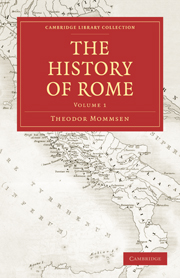Book contents
- Frontmatter
- PREFACE
- PREFATORY NOTE BY THE TRANSLATOR
- EXTRACT FROM DR. MOMMSEN'S PREFACE
- Contents
- BOOK FIRST THE PERIOD ANTERIOR TO THE ABOLITION OF THE MONARCHY
- CHAPTER I INTRODUCTION
- CHAPTER II THE EARLIEST MIGRATIONS INTO ITALY
- CHAPTER III THE SETTLEMENTS OF THE LATINS
- CHAPTER IV THE BEGINNINGS OF ROME
- CHAPTER V THE ORIGINAL CONSTITUTION OF ROME
- CHAPTER VI THE NON-BURGESSES AND THE REFORMED CONSTITUTION
- CHAPTER VII THE HEGEMONY OF ROME IN LATIUM
- CHAPTER VIII THE UMBRO-SABELLIAN STOCK—BEGINNINGS OF THE SAMNITES
- CHAPTER IX THE ETRUSCANS
- CHAPTER X THE HELLENES IN ITALY.—MARITIME SUPREMACY OF THE TUSCANS AND CARTHAGINIANS
- CHAPTER XI LAW AND JUSTICE
- CHAPTER XII RELIGION
- CHAPTER XIII AGRICULTURE, TRADE, AND COMMERCE
- CHAPTER XIV MEASURING AND WRITING
- CHAPTER XV ART
- BOOK SECOND FROM THE ABOLITION OF THE MONARCHY IN ROME TO THE UNION OF ITALY
- APPENDIX: ON THE PATRICIAN CLAUDII
- ADDITIONS AND CORRECTIONS
CHAPTER X - THE HELLENES IN ITALY.—MARITIME SUPREMACY OF THE TUSCANS AND CARTHAGINIANS
Published online by Cambridge University Press: 05 October 2010
- Frontmatter
- PREFACE
- PREFATORY NOTE BY THE TRANSLATOR
- EXTRACT FROM DR. MOMMSEN'S PREFACE
- Contents
- BOOK FIRST THE PERIOD ANTERIOR TO THE ABOLITION OF THE MONARCHY
- CHAPTER I INTRODUCTION
- CHAPTER II THE EARLIEST MIGRATIONS INTO ITALY
- CHAPTER III THE SETTLEMENTS OF THE LATINS
- CHAPTER IV THE BEGINNINGS OF ROME
- CHAPTER V THE ORIGINAL CONSTITUTION OF ROME
- CHAPTER VI THE NON-BURGESSES AND THE REFORMED CONSTITUTION
- CHAPTER VII THE HEGEMONY OF ROME IN LATIUM
- CHAPTER VIII THE UMBRO-SABELLIAN STOCK—BEGINNINGS OF THE SAMNITES
- CHAPTER IX THE ETRUSCANS
- CHAPTER X THE HELLENES IN ITALY.—MARITIME SUPREMACY OF THE TUSCANS AND CARTHAGINIANS
- CHAPTER XI LAW AND JUSTICE
- CHAPTER XII RELIGION
- CHAPTER XIII AGRICULTURE, TRADE, AND COMMERCE
- CHAPTER XIV MEASURING AND WRITING
- CHAPTER XV ART
- BOOK SECOND FROM THE ABOLITION OF THE MONARCHY IN ROME TO THE UNION OF ITALY
- APPENDIX: ON THE PATRICIAN CLAUDII
- ADDITIONS AND CORRECTIONS
Summary
Relations of Italy with other lands.
In the history of the nations of antiquity a gradual dawn ushered in the day; and in their case too the dawn was in the east. While the Italian peninsula still lay enveloped in the dim twilight of morning, the regions of the eastern basin of the Mediterranean had already emerged into the full light of a varied and richly developed civilization. It falls to the lot of most nations in the early stages of their development to be taught and trained by some rival sisternation; and such was destined to be in an eminent degree the lot of the peoples of Italy. The circumstances of its geographical position, however, prevented this influence from being brought to bear upon the peninsula by land. No trace is to be found of a resort in early times to the difficult route by land between Italy and Greece. There were, indeed, in all probability from time immemorial, tracks for purposes of traffic, leading from Italy to the lands beyond the Alps; the oldest route of the amber trade from the Baltic joined the Mediterranean at the mouth of the Po (on which account the delta of the Po appears in Greek legend as the native country of amber), and that route was joined by another leading across the peninsula and over the Apennines to Pisæ; but from these regions no elements of civilization could come to the Italians. It was the seafaring nations of the East that brought to Italy whatever foreign, culture reached it in early times.
- Type
- Chapter
- Information
- The History of Rome , pp. 135 - 155Publisher: Cambridge University PressPrint publication year: 2010First published in: 1862



